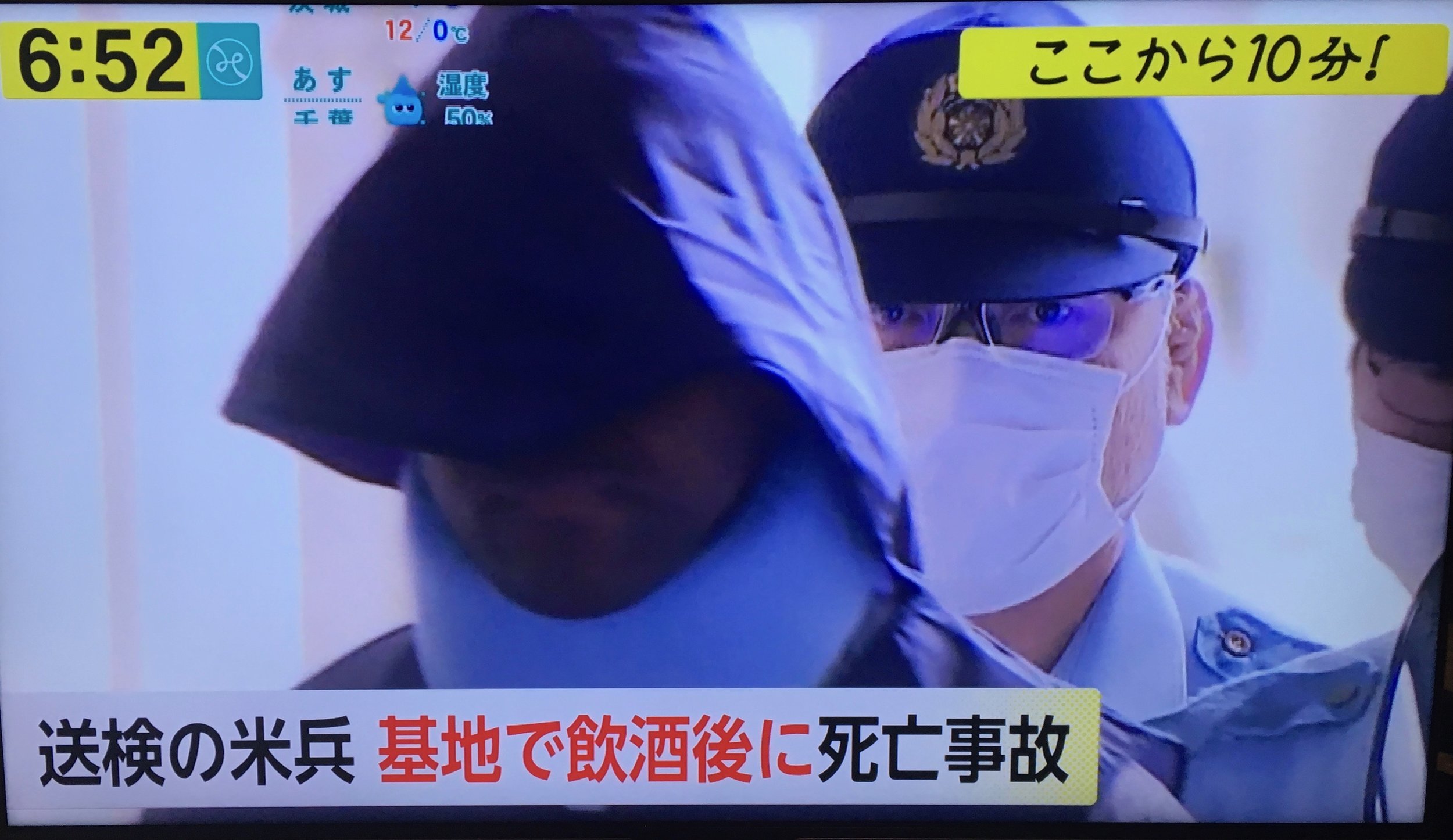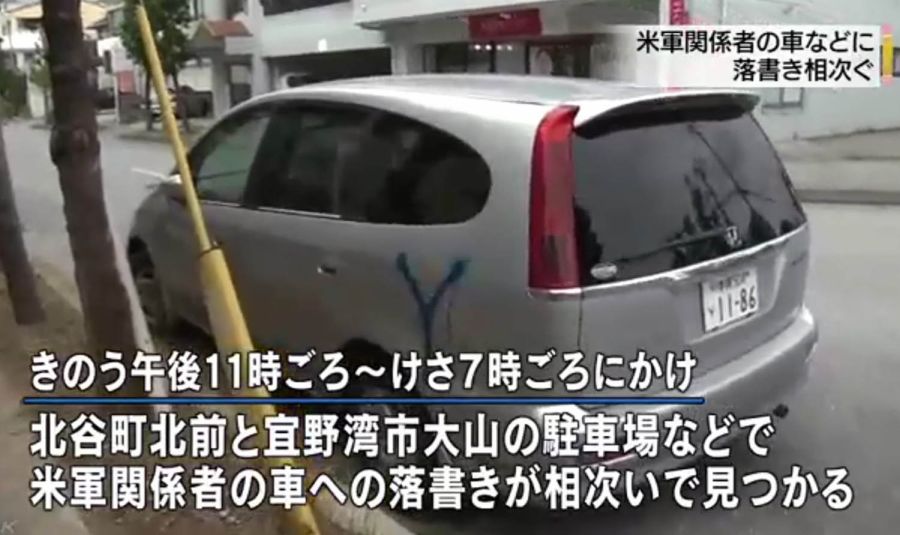Responding to Accidents and Crimes Committed by United States Forces Japan
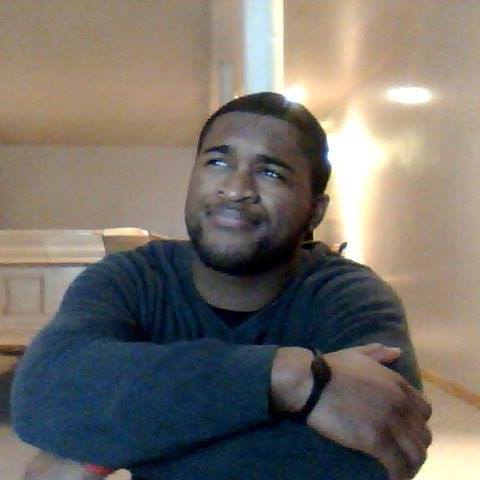 21-year-old Marine Lance Corporal. (LCpl) Nicholas James-McLean, based at Camp Kinser on Okinawa, has been arrested on suspicion of negligent driving resulting in the death of 61-year-old Hidemasa Taira. Mr. Taira was killed when his K-truck, shown below, was struck by a 2-ton Isuzu Elf truck driven by LCpl James-McLean at 5:25 a.m., Sunday, November 19, 2017 in Okinawa's capital of Naha. Mr. Taira died at local hospital from chest wounds and bleeding suffered in the crash while LCpl James-McLean had minor injuries.
21-year-old Marine Lance Corporal. (LCpl) Nicholas James-McLean, based at Camp Kinser on Okinawa, has been arrested on suspicion of negligent driving resulting in the death of 61-year-old Hidemasa Taira. Mr. Taira was killed when his K-truck, shown below, was struck by a 2-ton Isuzu Elf truck driven by LCpl James-McLean at 5:25 a.m., Sunday, November 19, 2017 in Okinawa's capital of Naha. Mr. Taira died at local hospital from chest wounds and bleeding suffered in the crash while LCpl James-McLean had minor injuries.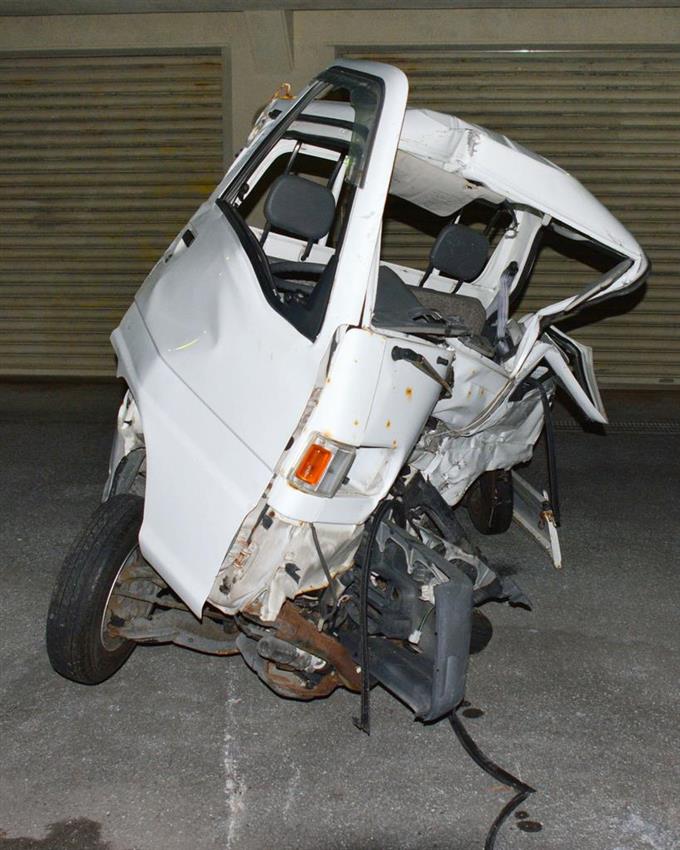 According to the Japan Times, "a witness reportedly told the police that LCpl James-McLean's vehicle, which was coming from the opposite direction, ran a red light and hit Mr. Taira's minitruck as he was attempting to make a right turn." LCpl James-McLean's blood alcohol content (BAC) was three times Japan's legal limit of 0.03 percent. In the United States, all states have a 0.08 per se law.
According to the Japan Times, "a witness reportedly told the police that LCpl James-McLean's vehicle, which was coming from the opposite direction, ran a red light and hit Mr. Taira's minitruck as he was attempting to make a right turn." LCpl James-McLean's blood alcohol content (BAC) was three times Japan's legal limit of 0.03 percent. In the United States, all states have a 0.08 per se law.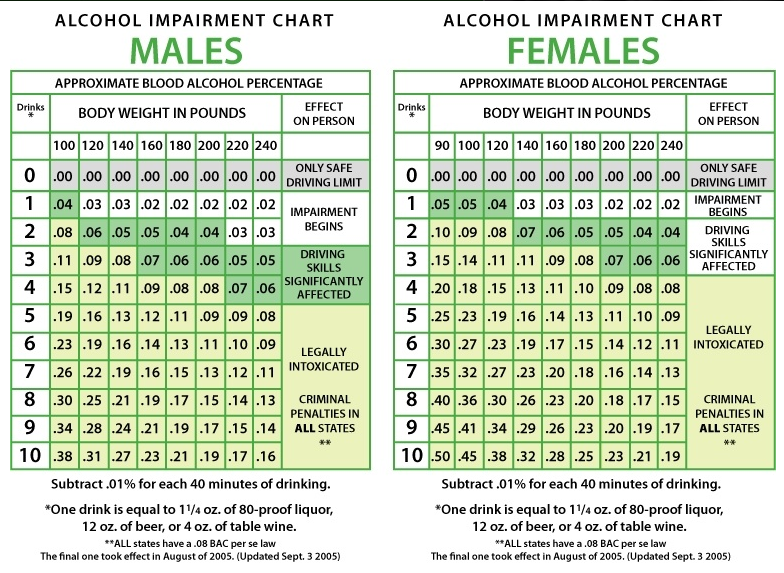 LCpl James-McLean Facebook profile shows that he lives in Naha, Okinawa. However, unless he is married, or authorized to reside off-base, it is very unlikely that he resides on the local economy due to his rank and whether he is on an accompanied tour. Why does his place of residence matter? Well, it immediately brings to question where he was traveling to/from at 5:25 a.m. on a Sunday? Why was he traveling in a USGOV vehicle? Was the vehicle dispatched from the motor pool? If not, was he authorized to remove the truck from his place of duty? Was Mr. Taira's death the result of a drunken Marine that decided to go for a joy ride?
LCpl James-McLean Facebook profile shows that he lives in Naha, Okinawa. However, unless he is married, or authorized to reside off-base, it is very unlikely that he resides on the local economy due to his rank and whether he is on an accompanied tour. Why does his place of residence matter? Well, it immediately brings to question where he was traveling to/from at 5:25 a.m. on a Sunday? Why was he traveling in a USGOV vehicle? Was the vehicle dispatched from the motor pool? If not, was he authorized to remove the truck from his place of duty? Was Mr. Taira's death the result of a drunken Marine that decided to go for a joy ride? Okinawan Prefectural Police (OPP) said the mini-truck that LCpl James-McLean was driving belonged to the US military. US officials have reported that LCpl James-McLean was off duty at the time of the crash. Under the Status of Forces Agreement (SOFA), the United States Government (USG) pays compensation to Japanese victims of off-duty incidents and accidents caused by US military personnel who are deemed incapable of paying. The remainder of the compensation will be borne by the Japanese Government in accordance with the 1996 SACO Accord.JNN provided video of the accident scene. Reportedly, LCpl James-McLean drank alcoholic beverages on base. However, YTV reported that James-McLean refused to answer where he consumed the alcoholic drinks. LCpl James-McLean has admitted to the charges.
Okinawan Prefectural Police (OPP) said the mini-truck that LCpl James-McLean was driving belonged to the US military. US officials have reported that LCpl James-McLean was off duty at the time of the crash. Under the Status of Forces Agreement (SOFA), the United States Government (USG) pays compensation to Japanese victims of off-duty incidents and accidents caused by US military personnel who are deemed incapable of paying. The remainder of the compensation will be borne by the Japanese Government in accordance with the 1996 SACO Accord.JNN provided video of the accident scene. Reportedly, LCpl James-McLean drank alcoholic beverages on base. However, YTV reported that James-McLean refused to answer where he consumed the alcoholic drinks. LCpl James-McLean has admitted to the charges.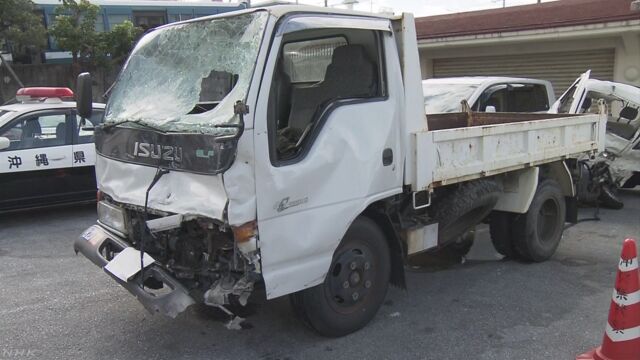 The Google Maps screenshot below shows that the distance from Naha to Camp Kinser is 5.7 km which is approximately a 12-minute drive. When I learned of the accident, I assumed LCpl James-McLean was on-duty and possibly traveling south on Highway 58 to Naha International Airport.
The Google Maps screenshot below shows that the distance from Naha to Camp Kinser is 5.7 km which is approximately a 12-minute drive. When I learned of the accident, I assumed LCpl James-McLean was on-duty and possibly traveling south on Highway 58 to Naha International Airport.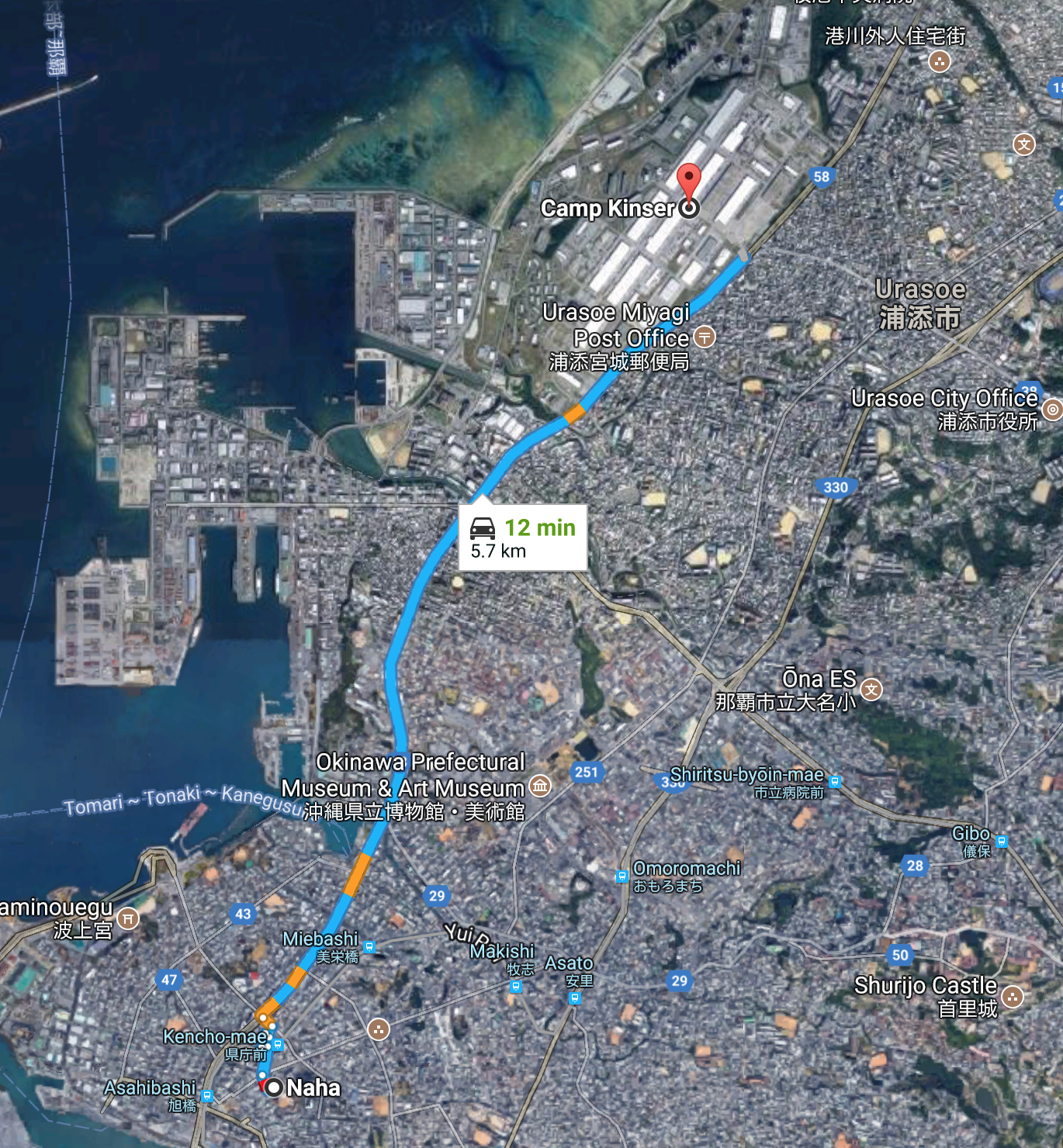 As shown in the illustration below, the green arrow denotes that LCpl James-McLean's vehicle was traveling southwest away from Camp Kinser. The K-truck driven by Mr. Taira, orange arrow, is in the right-turn lane.
As shown in the illustration below, the green arrow denotes that LCpl James-McLean's vehicle was traveling southwest away from Camp Kinser. The K-truck driven by Mr. Taira, orange arrow, is in the right-turn lane.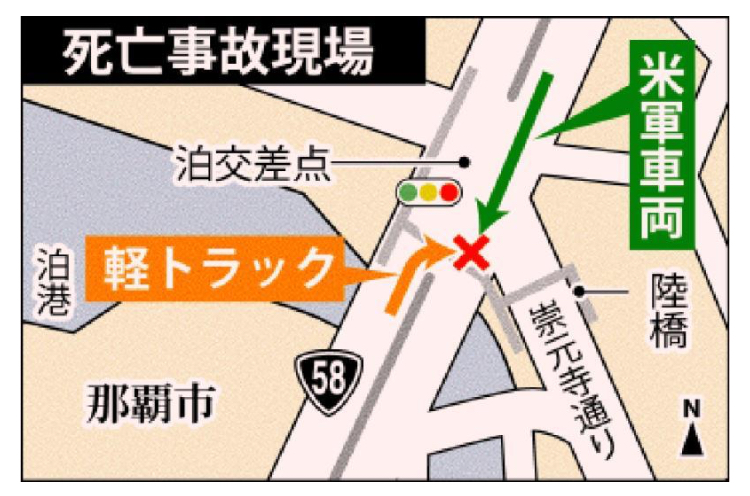 Judging by the damage to Mr. Taira's K-truck, it seems that LCpl McLean's vehicle struck the K-truck as Mr. Taira was either making a U-turn to travel in the opposite direction on Highway 58 or turning to enter Sogenjidori.
Judging by the damage to Mr. Taira's K-truck, it seems that LCpl McLean's vehicle struck the K-truck as Mr. Taira was either making a U-turn to travel in the opposite direction on Highway 58 or turning to enter Sogenjidori.  Given the red X, which denotes the site of impact, it appears Mr. Taira may have attempted to made a U-turn into the far left lane on Highway 58.
Given the red X, which denotes the site of impact, it appears Mr. Taira may have attempted to made a U-turn into the far left lane on Highway 58.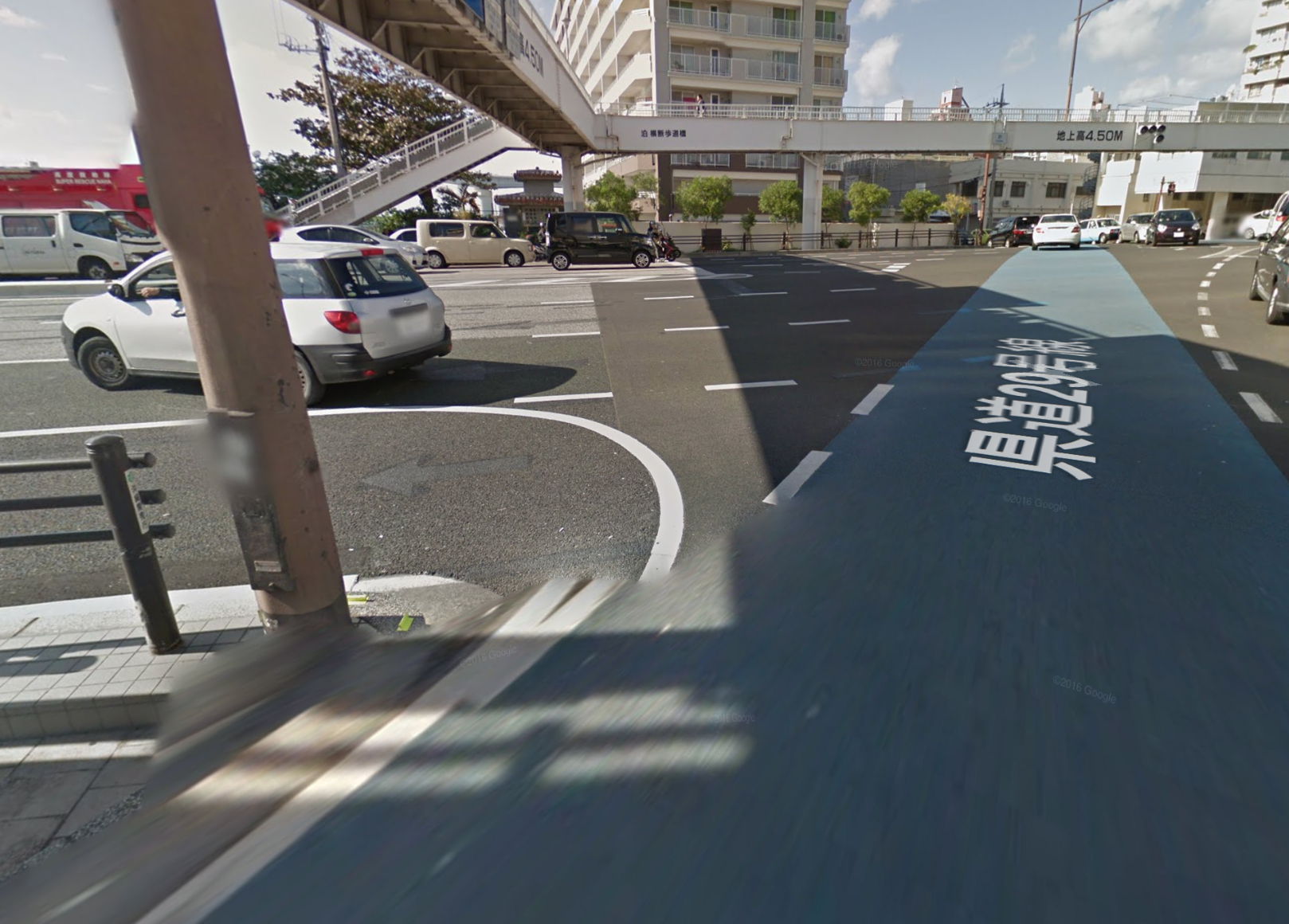
Stars and Stripes reported that "a number of U.S. military affiliated vehicles and apartment buildings were vandalized over the weekend, shortly after a fatal vehicle accident involving LCpl James-McLean and Mr. Taira. Twenty-nine vehicles owned by U.S. personnel were vandalized with paint sometime between Sunday evening and early Monday morning," according to the OPP.
Japanese Chief Cabinet Secretary Yoshihide Suga remarked that:
"It is extremely regrettable that this accident happened even though Japanese government has repeatedly asked for the thorough implementation of preventive measures and enforcement of disciplines."
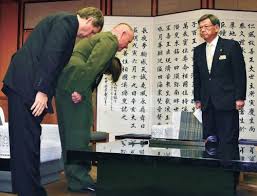 According to the Pacific Stars and Stripes, Lt. Gen. Lawrence Nicholson, Commanding General of Marine Forces Japan and III Marine Expeditionary Force, said in the statement:
According to the Pacific Stars and Stripes, Lt. Gen. Lawrence Nicholson, Commanding General of Marine Forces Japan and III Marine Expeditionary Force, said in the statement:
"I would like to convey my deepest regret and sincere condolences to the family and friends of the Okinawan man who died as a result of this accident. We are still gathering facts and working with the Japanese authorities who are investigating the accident and its causes. You have my promise that I will rigorously work to determine the cause of the incident, and take every possible step to keep this from happening again."
The Stars and Stripes also reported "U.S. Ambassador to Japan William Hagerty responded by apologizing and expressing his condolences to the victim killed in this tragic incident as well as his family and added that the U.S. side would cooperate with the investigation and move to prevent future incidents."[ad]Japan Today further reported that "Okinawa Gov. Takeshi Onaga appeared unhappy Monday despite the U.S. apology and restrictions. Onaga met with Nicholson and U.S. Consul General Joel Ehrendreich and handed them a letter of protest which in part read:
“Every time such an accident takes place . . . the Okinawa Prefectural Government has urged the U.S. Forces to make sure to implement preventive measures, enforce stricter discipline and conduct thorough education programs. Despite our repeated requests, however, the accident took place, taking a precious human life. We cannot contain our indignation.”
Although, I understand Onaga's anger over Mr. Taira’s death and am equally frustrated that a USFJ servicemember has committed a crime, Onaga is off the mark when it comes to the USFJ's preventive measures, enforcement of stricter discipline, and conducting thorough education programs. The USFJ have various programs in place which are effective in decreasing the number of incidents committed by USFJ personnel. The statistic that SOFA-status personnel have committed 5,896 crimes since 1972 is often cited. What is overlooked is that the rest of Okinawa’s populace has a crime rate more than twice as high over the same period with 69.7 crimes per 10,000 people, compared with 27.4 by SOFA members. As I said before, one crime committed by USFJ personnel is too many.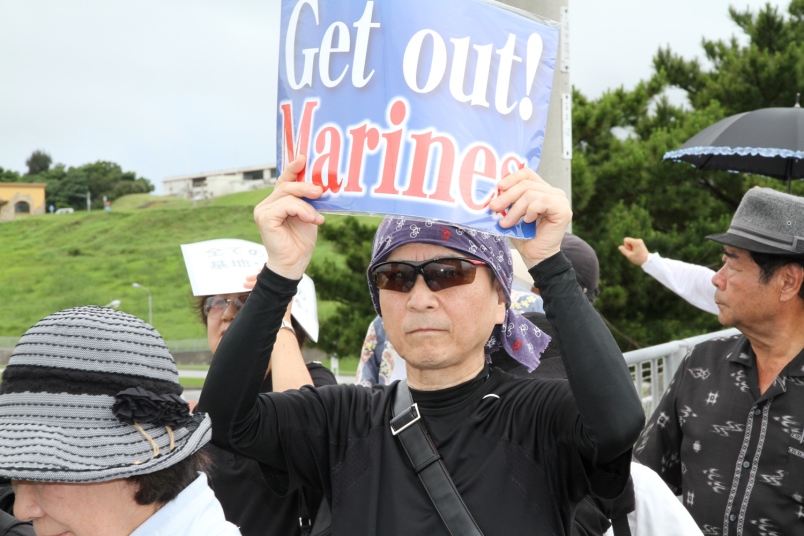 As I have previously reported, the Okinawan media disproportionately finds USFJ military and civilian personnel and their dependents responsible for accidents and crimes. According to Lisa Takeuchi Cullen, “Okinawa hates America, and Okinawa loves America. Okinawa is in fact so American that it can appear deceptively like home.” However, the assertion that USFJ personnel are responsible for an abundance of accidents and crimes is false! There are motives as to why this type of reporting occurs. For example, Erik Slavin and Chiyomi Sumida reported in their 2016 article, Politics play role in Tokyo's reaction to US crime on Okinawa:
As I have previously reported, the Okinawan media disproportionately finds USFJ military and civilian personnel and their dependents responsible for accidents and crimes. According to Lisa Takeuchi Cullen, “Okinawa hates America, and Okinawa loves America. Okinawa is in fact so American that it can appear deceptively like home.” However, the assertion that USFJ personnel are responsible for an abundance of accidents and crimes is false! There are motives as to why this type of reporting occurs. For example, Erik Slavin and Chiyomi Sumida reported in their 2016 article, Politics play role in Tokyo's reaction to US crime on Okinawa:
Out of 3,410 Okinawa arrests in 2014, only 27 involved SOFA personnel, according to Okinawa police figures. There also was just one charge of a heinous felony, a rape, which was later dropped by prosecutors.
Slavin and Sumida further reported that "news stories have at times depicted Okinawa as rife with servicemember crime and utterly opposed to the U.S. military presence" and "for most of mainland Japan, outside of cities like Yokosuka and Sasebo, crime among servicemembers and civilians covered under the status of forces agreement is a distant concept." However, when an incident occurs whether in Okinawa or Mainland Japan, all USFJ military, civilian personnel, as well as their dependents, are impacted.According to CNN, "US military personnel and civilian contractors working for American forces have been accused of multiple crimes in Okinawa this year. From January to October 2017, two have been arrested on allegations of robbery, two on allegations of rape and six on allegations of violent offenses, according to the Okinawa Prefecture Police website."In response to the latest incident, U.S. Forces Japan Commander, Lt. Gen. Jerry Martinez, issued the following order: "All Japan-based servicemembers are banned from buying or consuming alcohol!"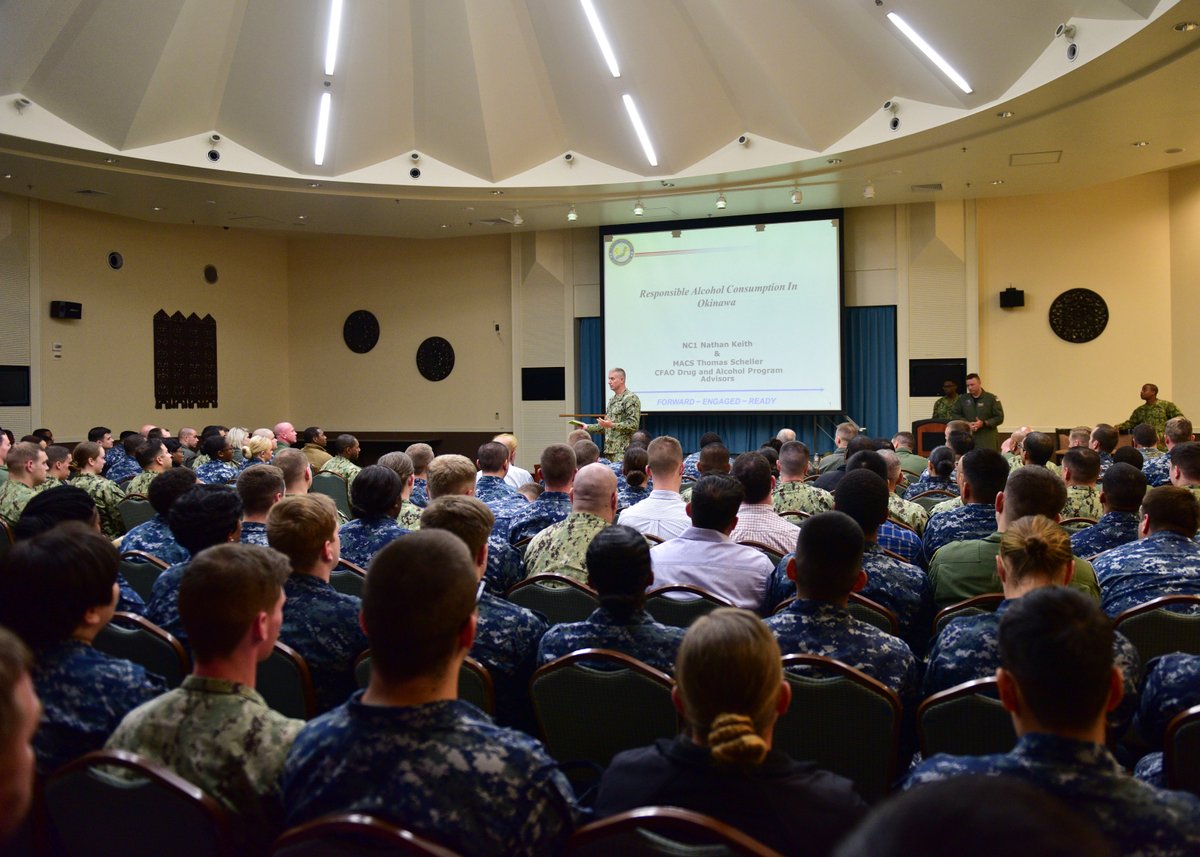 "Commanders across Japan will immediately lead mandatory training on responsible alcohol use and acceptable behavior. When our service members fail to live up to the high standards we set for them, it damages the bonds between bases and local communities and makes it harder for us to accomplish our mission," USFJ, said in a statement posted on its website."
"Commanders across Japan will immediately lead mandatory training on responsible alcohol use and acceptable behavior. When our service members fail to live up to the high standards we set for them, it damages the bonds between bases and local communities and makes it harder for us to accomplish our mission," USFJ, said in a statement posted on its website."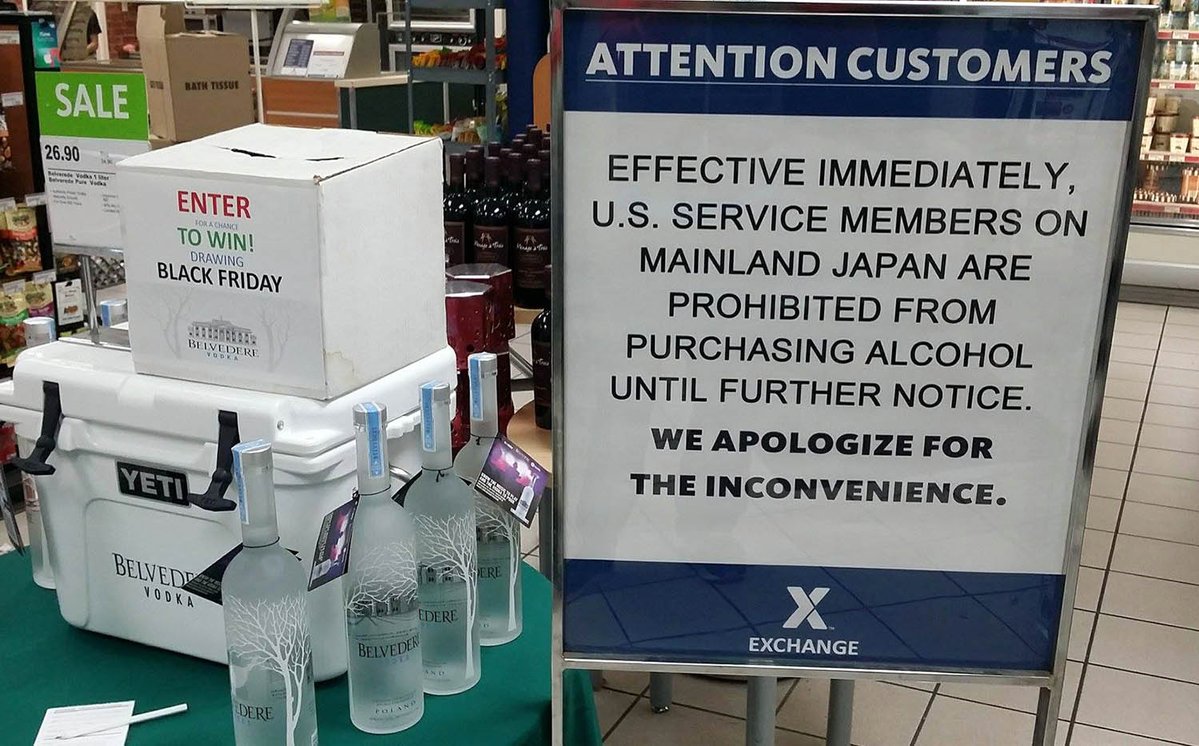 The USFJ website also diseminated the following in response to Sunday's incident:
The USFJ website also diseminated the following in response to Sunday's incident:
Effective immediately, U.S. service members on Okinawa are restricted to base and to their residences. Until further notice, alcohol consumption is prohibited. This includes in residences and public locations such as bars and clubs, and hotels. Additionally, U.S. service members on mainland Japan are prohibited from purchasing or consuming alcohol, on or off base.
The following information was issued three days after the accident:
Effective at 4:30 p.m., Wednesday, Nov. 22, all uniformed personnel in Okinawa will move to a Tier-2 modified liberty status. Off-base liberty island-wide is authorized from 5 a.m. to midnight for all ranks. Until further notice, there will be no sale or consumption of alcohol on or off base. During this holiday, take time to reflect as to why we are here in Japan, so far away from home and family.
I expect the order to be in place at least for two-weeks but for not more than a month. Additional information on the USFJ policy can be found via the "Liberty Order for All U.S. Military Forces Located or Operating in Japan.As discussed on social media, USFJ servicemembers and their dependents are rightfully appalled over this recent incident. Many have voiced their anger that Mr. Taira lost his life over LCpl McLean's reckless actions. Many are also upset that a Marine has yet committed another crime. Some are upset and have voiced their concerns regarding the blanket punishment imposed, as many believe imposing a blanket punishment is not the best way to battle DUI incidents. Well, those sentiments are noted, however, ALL must understand that the USFJ Commander has to send a statement that this or any other incident commited by USFJ personnel and their dependents will not be tolerated. The USG and USFJ military and civilians must show remorse and demonstrate that Americans will continue to take steps to not only educate those under the SOFA but to "deter" future occurrences of accidents and crimes. By the way, notice that I did not use the term "prevent." I do not feel that the USFJ can prevent acccidents and crimes from occuring.Based on my professional and personal experiences, I believe that the USFJ is in a no-win situation. Of course, action must be taken to address and hopefully mitigate future incidents but it is unreasonable to expect that zero incidents will occur. I say this with the caveat that the USFJ should strive for zero incidents but I am being realistic in understanding the human nature of those that do stupid sh!t or place themself in a situation that could have easily been avoided. As I have mentioned previously, and as the USG and USFJ have repeatedly stated, "one incident is one too many!"Those that follow Black Tokyo social media channels know that I am a long time resident of Japan. I too have experienced bans of alcohol consumption, curfews, and restriction to base. When I served in the U.S. Marine Corps at MCAS Futenma and Camp Hansen on Okinawa during the 1980's and 90's, USFJ servicemembers committed accidents and crimes. It is unrealistic to expect that things would change now. As said elsewhere, it is impossible to eliminate the problem — it speaks more to people’s fallibilities than to the failings of command leadership to get troops to follow orders."
Well, those sentiments are noted, however, ALL must understand that the USFJ Commander has to send a statement that this or any other incident commited by USFJ personnel and their dependents will not be tolerated. The USG and USFJ military and civilians must show remorse and demonstrate that Americans will continue to take steps to not only educate those under the SOFA but to "deter" future occurrences of accidents and crimes. By the way, notice that I did not use the term "prevent." I do not feel that the USFJ can prevent acccidents and crimes from occuring.Based on my professional and personal experiences, I believe that the USFJ is in a no-win situation. Of course, action must be taken to address and hopefully mitigate future incidents but it is unreasonable to expect that zero incidents will occur. I say this with the caveat that the USFJ should strive for zero incidents but I am being realistic in understanding the human nature of those that do stupid sh!t or place themself in a situation that could have easily been avoided. As I have mentioned previously, and as the USG and USFJ have repeatedly stated, "one incident is one too many!"Those that follow Black Tokyo social media channels know that I am a long time resident of Japan. I too have experienced bans of alcohol consumption, curfews, and restriction to base. When I served in the U.S. Marine Corps at MCAS Futenma and Camp Hansen on Okinawa during the 1980's and 90's, USFJ servicemembers committed accidents and crimes. It is unrealistic to expect that things would change now. As said elsewhere, it is impossible to eliminate the problem — it speaks more to people’s fallibilities than to the failings of command leadership to get troops to follow orders."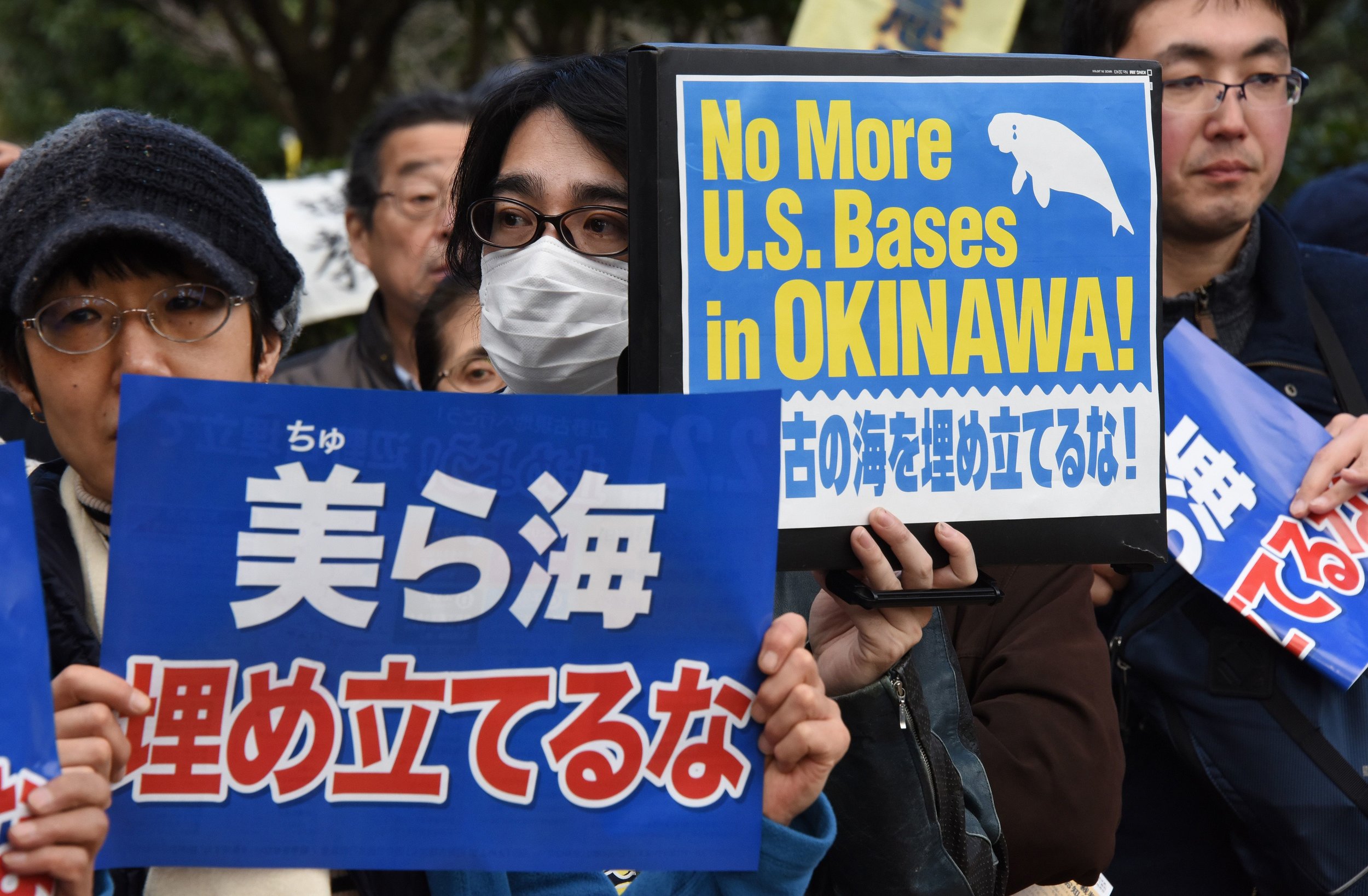 One should be upset over the loss of life and the choice made by LCpl James-McLean to drive a vehicle while under the influence. As I have also served in the U.S. Marine Corps, I am angry that a Marine is at the center of this current storm in Okinawa. I should also add that I am equally mad as hell that a young Black American male is once again the face of ire when it comes to crimes committed by U.S. servicemembers in Japan. You may ask, "Does it matter what color the person is that allegedly committed the crime?" Yes! Just as it is said that the USFJ military personnel and their family members are unofficial ambassadors to Japan, Black men, in this case, have unofficially and officially not been seen in the best light when it comes to the media both at home and abroad. "Please don't let him be Black!" can often be found on many social media commentary when discussing crimes. Those that know, understand this. Those that don't, consider this being let in on a little secret!
One should be upset over the loss of life and the choice made by LCpl James-McLean to drive a vehicle while under the influence. As I have also served in the U.S. Marine Corps, I am angry that a Marine is at the center of this current storm in Okinawa. I should also add that I am equally mad as hell that a young Black American male is once again the face of ire when it comes to crimes committed by U.S. servicemembers in Japan. You may ask, "Does it matter what color the person is that allegedly committed the crime?" Yes! Just as it is said that the USFJ military personnel and their family members are unofficial ambassadors to Japan, Black men, in this case, have unofficially and officially not been seen in the best light when it comes to the media both at home and abroad. "Please don't let him be Black!" can often be found on many social media commentary when discussing crimes. Those that know, understand this. Those that don't, consider this being let in on a little secret!
- 2016 marked the 27th consecutive year that Okinawa is worst in the nation for DUI.
- 1,856 people were arrested for DUI, up 224 from the previous year. The number of arrests is the largest number in Japan in absolute terms for the second year in a row.
- 1.3 persons per 1,000 was arrested for DUI, which is about 6.4 times Japan's national average.
- 5,491 total traffic accidents occurred in Okinawa in 2016.
- 109 of the accidents were related to consumption of alcohol.
- 1.99% of all accidents in Okinawa Prefecture are alcohol-rated.
- 13 of 38 cases of traffic deaths in 2016 were related to DUI, the worst in the nation for the 4th consecutive year.
- 599 of 1,845 of those arrested for DUI stated “I didn’t think that I would be arrested.”
The Stars and Stripes reported: "The overall crime rate since 1972 has been about seven crimes per 1,000 people locally and 2.75 among the U.S. military community. But the number of alcohol-related incidents is almost even, and that’s what catches the attention of Okinawans and the media."[code]
